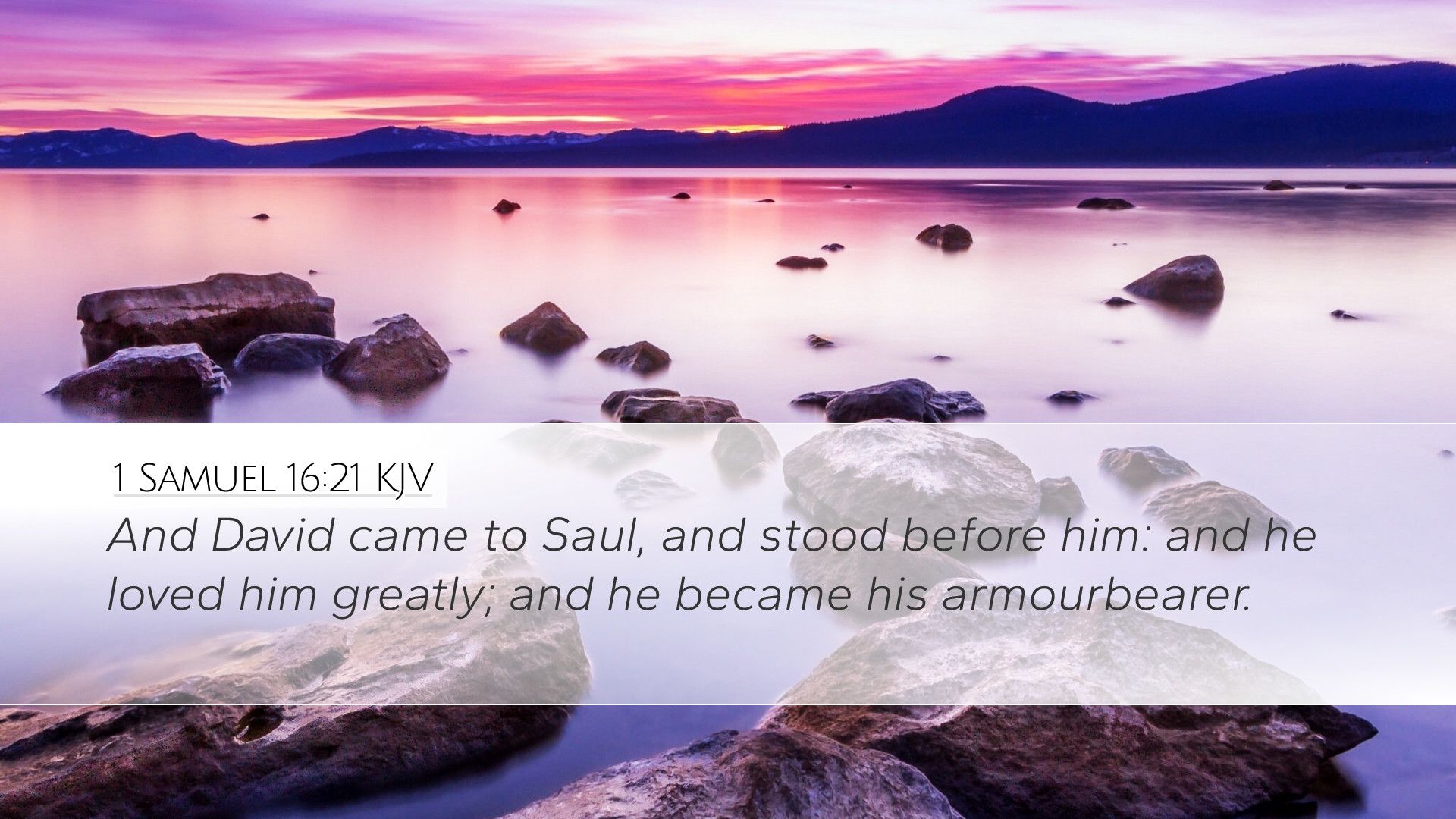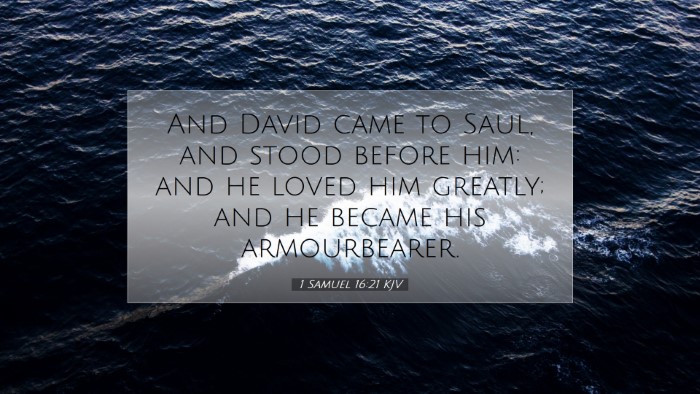1 Samuel 16:21 - “And David came to Saul, and stood before him: and he loved him greatly; and he became his armor bearer.”
Commentary on 1 Samuel 16:21
This verse represents a significant moment in the narrative of David and Saul. The transition in leadership from Saul to David is highlighted, as well as the intricate human relationships that characterize the story. Here we delve into insights from esteemed biblical scholars and commentators to illuminate this passage for pastors, students, and theologians.
Overview and Context
The context of 1 Samuel 16 is crucial for understanding the events that lead up to this verse. Samuel has anointed David as king in place of Saul, who has fallen out of favor with God due to disobedience. Though David is chosen as the future king, he initially serves in the court of Saul, showcasing a divine plan that unfolds over time.
Insights from Matthew Henry
Matthew Henry emphasizes the providence of God in the arrangement of David's entry into Saul's service. He notes that despite Saul's declining spirit and the removal of divine favor, David’s coming to the palace symbolizes a new chapter in God’s unfolding plan. Henry reflects on how God often prepares the way for His chosen vessels through both trials and opportunities.
Key Points from Henry:
- Divine Providence: David's arrival at Saul's court was not happenstance but rather a part of God's sovereign design.
- A Contrast in Spirits: The section illustrates the contrast between the troubled spirit of Saul and the future king's calm demeanor, underscoring David's anointing as preparing him for leadership.
- Service as Preparation: David’s role as armor bearer serves both as a position of honor and a season of practical preparation for his future kingship.
Insights from Albert Barnes
Albert Barnes provides a detailed commentary on how this verse reflects the early relationship between David and Saul. He notes that the mutual affection mentioned indicates God’s hand in their connection, heralding David’s service as crucial for his future role.
Key Points from Barnes:
- Nature of Their Relationship: Saul's love for David is notable, as it hints at the complexity of their future interactions. This admiration contrasts with Saul's later jealousy.
- Role of Music: As the context suggests, David's skillful playing of the harp provided comfort to Saul, highlighting the therapeutic power of music and its ability to soothe troubled spirits.
- Preparation for Leadership: Serving as an armor bearer imbues David with valuable experiences that will later serve him in his kingship.
Insights from Adam Clarke
Adam Clarke elaborates on the significance of David’s position and the emotional dynamics at play. He logically explores the implications of David's installation in Saul's court, particularly in the context of Israel's need for a leader during tumultuous times.
Key Points from Clarke:
- Symbol of Hope: David’s presence in Saul's court symbolizes hope for Israel amidst Saul's deteriorating leadership.
- Spiritual Implications: Clarke emphasizes the spiritual condition of both Saul and David, indicating that while Saul struggles with a troubled spirit, David exemplifies an anointed servant of God.
- Foreshadowing Future Conflict: Clarke foreshadows the brewing conflict between the two, as the growing favor of David may inevitably lead to Saul’s jealousy and insecurity.
Theological Reflections
1 Samuel 16:21 provides rich theological implications, reinforcing themes of divine purpose, leadership, and the human condition. The juxtaposition of Saul's troubled kingship with David’s emerging role illustrates not only the sovereignty of God but also the nuanced dynamics of authority and influence.
Theological Themes:
- Sovereignty of God: God's choice of David over Saul points to His sovereign authority in appointing leaders.
- Human Relationships: The complexities of Saul and David’s relationship underline the profound emotional struggles of leadership, characterized by love, jealousy, and eventual conflict.
- Preparation Through Service: The principle that service prepares one for leadership is evident in David’s trajectory, reminding leaders of the importance of humility and preparation.
Conclusion
1 Samuel 16:21 serves as a crucial turning point in biblical history, emphasizing God’s providence and the intricate relationships that shape leadership. By studying this passage through the lenses of Matthew Henry, Albert Barnes, and Adam Clarke, readers gain valuable insights into the text's richness, preparing them for deeper theological reflection and practical application in their ministry and personal lives.


